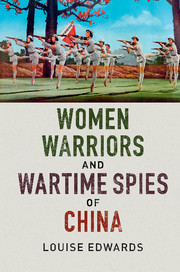Book contents
- Frontmatter
- Dedication
- Contents
- List of Figures
- Acknowledgements
- Chronology
- 1 Soldiering, war and gender in China
- 2 The archetypal woman warrior, Hua Mulan: Militarising filial piety
- 3 Qiu Jin: Transitioning from traditional swordswoman to feminist warrior
- 4 Xie Bingying opening public spaces to women Fighting patriarchy and fighting militarists
- 5 Aisin Gioro Xianyu: ‘Joan of Arc of the Orient’ or ‘Mata Hari of the East’?
- 6 Guerrilla resistance leader, Zhao Yiman: Warrior teacher and self-sacrificing CCP mother
- 7 Negotiating sexual virtue: The glamorous, honey-trap spy, Zheng Pingru
- 8 Ding Ling and Zhenzhen: Female chastity and good communist governance
- 9 Mobilising and militarising rural China through the girl martyr, Liu Hulan
- 10 Women warriors and wartime spies as tools for ‘total militarisation’: The Red Detachment of Women
- Notes
- Bibliography
- Index
9 - Mobilising and militarising rural China through the girl martyr, Liu Hulan
Published online by Cambridge University Press: 05 March 2016
- Frontmatter
- Dedication
- Contents
- List of Figures
- Acknowledgements
- Chronology
- 1 Soldiering, war and gender in China
- 2 The archetypal woman warrior, Hua Mulan: Militarising filial piety
- 3 Qiu Jin: Transitioning from traditional swordswoman to feminist warrior
- 4 Xie Bingying opening public spaces to women Fighting patriarchy and fighting militarists
- 5 Aisin Gioro Xianyu: ‘Joan of Arc of the Orient’ or ‘Mata Hari of the East’?
- 6 Guerrilla resistance leader, Zhao Yiman: Warrior teacher and self-sacrificing CCP mother
- 7 Negotiating sexual virtue: The glamorous, honey-trap spy, Zheng Pingru
- 8 Ding Ling and Zhenzhen: Female chastity and good communist governance
- 9 Mobilising and militarising rural China through the girl martyr, Liu Hulan
- 10 Women warriors and wartime spies as tools for ‘total militarisation’: The Red Detachment of Women
- Notes
- Bibliography
- Index
Summary
In the winter of 1947 a teenaged girl from a small Shanxi village was beheaded with a hay-cutter-turned guillotine – Liu Hulan was another victim of the bloody Chinese Civil War of 1946–1949 in which the Chinese Communist Party (CCP) and the Nationalist Party vied for control over the country. Her membership of the CCP and active involvement in its armed struggle within the local People's Militia drew her into danger as the village came into Nationalist hands. Within weeks of her execution, the CCP mobilised the story of Liu Hulan to rally support for its campaign. Mao Zedong himself declared that hers was ‘A great life and a glorious death’ and personally penned the calligraphy of this epithet that now graces the various memorials and materials constructed and produced in her honour. A peasant girl of enormous courage and bravery, defiant in the face of death and resistant to her captors’ demands that she recant her communist beliefs and betray her comrades, Hulan has been hailed as a heroic communist martyr for well over half a century.
This chapter explores the use of the story of the girl warrior, Liu Hulan, to understand the CCP's militarisation of ordinary citizens – particularly rural dwellers. From the establishment of the PRC (People's Republic of China), the CCP and its military, the People's Liberation Army (PLA), have maintained an extensive network of People's Militias – building off those that had operated in rural China during the wars against Japan and the Nationalist Party. The chapter shows that women warriors can be particularly effective in propagandising the ideal of ‘citizen soldiers’ because they are able to simultaneously invoke martial valour and virtues of the ‘hearth and home’ while also revealing the permeability of the boundaries between home and battlefield. In the case of the girl martyr/woman martyr warrior, we also see how proponents of militarisation promote the ideal of youthful passion and use the tragedy of early death as emotional hooks to draw the audience into sympathy with their ideology.
The People's Militia (minbing) is ‘a civilian mass organisation of politically reliable and physically fit men and women under the dual leadership of the Chinese Communist Party and the PLA’. Integral to the CCP's military and political success in the years leading up to 1949 the organisation became regularised and actively promoted after 1949.
- Type
- Chapter
- Information
- Women Warriors and Wartime Spies of China , pp. 175 - 197Publisher: Cambridge University PressPrint publication year: 2016



